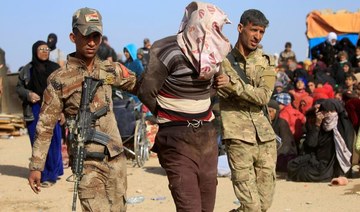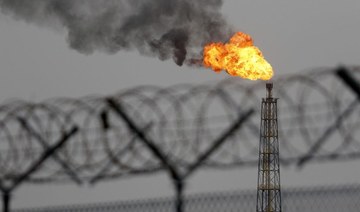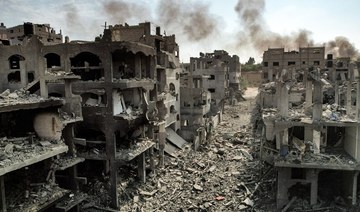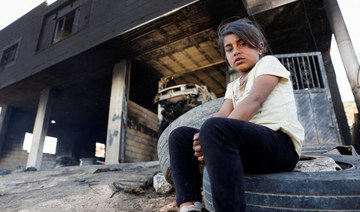SAO PAULO/BRASILIA: A proposal by Brazil’s next president to relocate its embassy in Israel, following US President Donald Trump’s lead, may set off a diplomatic storm in the Muslim world, threatening a key market for the world’s largest meat companies.
Brazil is by far the world’s largest exporter of halal meat, which complies with Muslim dietary rules. President-elect Jair Bolsonaro’s plans to move Brazil’s embassy from Tel Aviv to Jerusalem, strengthening relations with Israel, has already upset Egypt and could soon stir trouble with other Islamic nations.
“The reaction will be given not only as an individual country but on behalf of the whole Muslim world,” a Turkish diplomatic source told Reuters on condition of anonymity. “We are expecting Brazil to act with reason and not confront the Muslim world.”
Brazil exports $16 billion annually to the Middle East and Turkey, with just 3 percent going to Israel, according to government statistics.
More than a quarter of Brazil’s exports to the region are meat. Both Brazil’s JBS SA, the world’s top beef producer, and BRF SA, the No. 1 poultry exporter, have bet big on the growing demand for halal meat.
Brazil exports over $5 billion of halal meat per year, more than twice its nearest rivals, Australia and India, according to Salaam Gateway, a partnership between the Dubai Islamic Economy Development Center and Thomson Reuters.
Bolsonaro’s proposal for the Israel embassy is part of his overhaul of Brazilian foreign policy, cozying up to major powers such as the United States and undoing what he calls leftist predecessors’ alliances based on “ideological bias.”
Trump’s decision to open an embassy in Jerusalem in May stirred a hornets’ nest in the Middle East, and the United States had few allies follow suit. Guatemala did so in the days afterward while Paraguay has since reversed a similar decision.
Israeli Prime Minister Benjamin Netanyahu praised Bolsonaro for the plan to move Brazil’s embassy, calling him a “friend.”
But after Egypt abruptly canceled a visit from Brazilian diplomats and business leaders this week, Bolsonaro said his decision on the embassy in Israel was not final.
Bolsonaro has shown already he is not afraid to give an important trade partner a poke in the eye, following the example of the US president, whom he openly admires and emulates in both political style and foreign policy.
Like Trump, Bolsonaro railed against China on the campaign trail. He has softened his stance since the election last month, however, amid lobbying from diplomats and executives keen to protect relations with Brazil’s largest trading partner.
The pressure from the Middle East may be more blunt.
Egypt on Monday called off the visit by Brazil’s top diplomat and executives just days before they were set to arrive, which two diplomatic sources said was a direct response to Bolsonaro’s proposal to move the embassy.
The Egyptian embassy blamed a scheduling conflict.
That has sounded alarm bells in Brazil’s meat industry.
BRF Chairman Pedro Parente said on Thursday earnings call that the Israel embassy issue was “cause for concern.”
“We have a very important trade with Arab and halal markets,” he told journalists. “We are confident that when a discussion of the matter involves the relevant areas — the farm, trade and foreign ministries — they will certainly reach the best solution.”
BRF’s halal business segment contributed a quarter of its operating revenue and nearly half of its operating profit in the third quarter.
Halal chicken represented nearly half of Brazil’s overall chicken exports of $7.1 billion last year, according to Brazil meatpacking group ABPA.
“There is a $2-billion trade between Egypt and Brazil, mainly in the food agricultural sector, and within that sector mainly in beef and poultry,” Egypt’s Ambassador to Brazil Alaa Roushdy told Reuters.
He declined to comment on a hypothetical move of the embassy or if it could have any impact on trade.
BRF has processing plants in Turkey and the United Arab Emirates to meet growing demand for halal meat. The company aims to double its output of processed products in the Gulf by 2023, its head of halal operations said at an October event.
JBS sent more than an eighth of its exports to the Middle East and Africa in 2017, second only to the Greater China region.
Representatives for JBS declined to comment on fallout from a potential embassy move.
The Arab-Brazil Chamber of Commerce expects Brazil’s total exports to a grouping of 22 Arab countries, which excludes non-Arab Muslim nations such as Iran, to swell to $20 billion by 2022, up from $13.5 billion in 2017.
Rubens Hannun, the chamber’s president, added that Brazil also stands to benefit from infrastructure investment from Arab sovereign funds. UAE’s Mubadala Development Co, for example, poured some $2 billion into Brazilian commodities empire EBX earlier this decade.
“We do not want any noise in this relationship,” Hannun said. “We are afraid that would open a door for the competition.”
Brazil risks Middle East trade with Israel embassy move
Brazil risks Middle East trade with Israel embassy move

- Brazil exports $16 billion annually to the Middle East and Turkey
- More than a quarter of Brazil’s exports to the region are meat
Yemen’s Houthis carry out three military operations in Gulf of Aden, Indian Ocean
CAIRO: Yemen’s Houthis said they targeted the Maersk Yorktown ship and an American warship destroyer in the Gulf of Aden as well as targeting the Israeli ship MSC Veracruz in the Indian Ocean, the Iran-aligned group’s military spokesman Yahya Sarea said in a televised speech on Wednesday.
Iraq hangs 11 convicted of ‘terrorism’: security, health sources
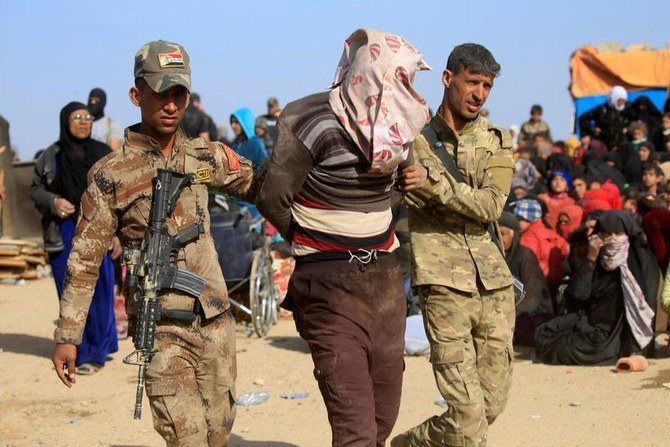
- Under Iraqi law, terrorism and murder offenses are punishable by death, and execution decrees must be signed by the president
- A security source in Iraq’s southern Dhi Qar province told AFP that 11 “terrorists from the Daesh group” were executed by hanging at a prison in Nasiriyah
NASIRIYAH, Iraq: Iraqi authorities have executed at least 11 people convicted of “terrorism” this week, security and health sources said Wednesday, with rights group Amnesty International condemning an “alarming lack of transparency.”
Under Iraqi law, terrorism and murder offenses are punishable by death, and execution decrees must be signed by the president.
A security source in Iraq’s southern Dhi Qar province told AFP that 11 “terrorists from the Daesh group” were executed by hanging at a prison in the city of Nasiriyah, “under the supervision of a justice ministry team.”
A local medical source confirmed that the health department had received the bodies of 11 executed people.
They were hanged on Monday “under Article 4 of the anti-terrorism law,” the source added, requesting anonymity due to the sensitivity of the issue.
All 11 were from Salahaddin province and the bodies of seven had been returned to their families, the medical official said.
Iraqi courts have handed down hundreds of death and life sentences in recent years for people convicted of membership in “a terrorist group,” an offense that carries capital punishment regardless of whether the defendant had been an active fighter.
Iraq has been criticized for trials denounced by rights groups as hasty, with confessions sometimes obtained under torture.
Amnesty in a statement on Wednesday condemned the latest hangings for “overly broad and vague terrorism charges.”
It said a total of 13 men were executed on Monday, including 11 who had been “convicted on the basis of their affiliation to the so-called Daesh armed group.”
The two others, arrested in 2008, “were convicted of terrorism-related offenses under the Penal Code after a grossly unfair trial,” Amnesty said citing their lawyer.
Biden says Israel must allow aid to Palestinians ‘without delay’
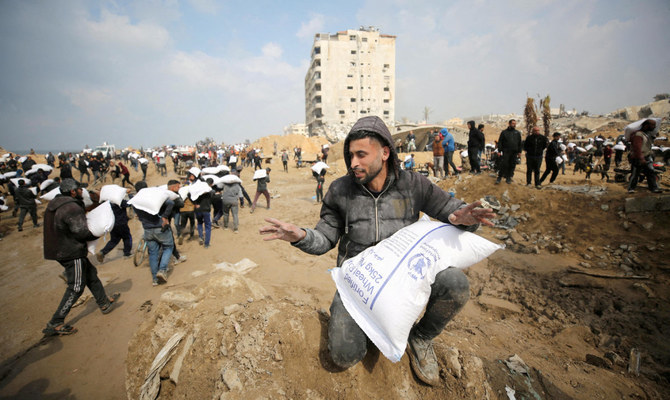
- “We’re going to immediately secure that aid and surge it,” Biden said
- “Israel must make sure all this aid reaches the Palestinians in Gaza without delay“
WASHINGTON: President Joe Biden on Wednesday demanded that new humanitarian aid be allowed to immediately reach Palestinians in the Gaza Strip as key US ally Israel fights Hamas there.
“We’re going to immediately secure that aid and surge it... including food, medical supplies, clean water,” Biden said after signing a massive military aid bill for Israel and Ukraine, which also included $1 billion in humanitarian aid for Gaza.
“Israel must make sure all this aid reaches the Palestinians in Gaza without delay,” he said.
US-Israel relations have been strained by Israel’s conduct of the war in Gaza and Israeli Prime Minister Benjamin Netanyahu’s plan to send troops into the southern Gazan city of Rafah, where 1.5 million people are sheltering, many in makeshift encampments.
“This bill significantly — significantly — increases humanitarian assistance we’re sending to the innocent people of Gaza who are suffering badly,” Biden said.
“They’re suffering the consequences of this war that Hamas started, and we’ve been working intently for months to get as much aid to Gaza as possible.”
Israel hits Lebanese border towns with 14 missiles
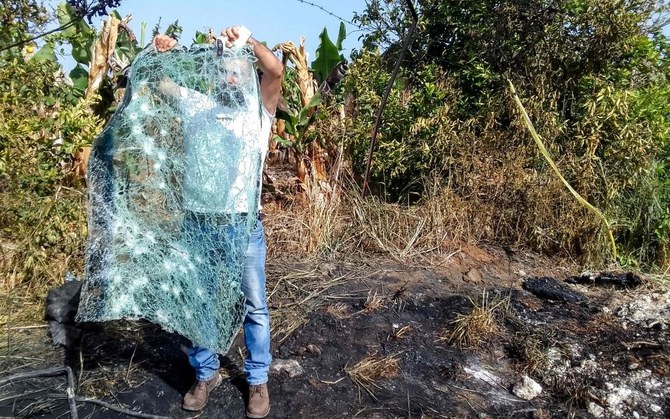
- Hezbollah targets Israeli settlements in retaliation for Hanin civilian deaths
- Hezbollah said it attacked the Shomera settlement with dozens of Katyusha rockets
BEIRUT: Clashes between Hezbollah and Israeli forces escalated sharply on Wednesday, the 200th day of conflict in southern Lebanon’s border area.
Israeli airstrikes created a ring of fire around Lebanese border towns, with at least 14 missiles hitting the area.
In the past two days, military activity in the border region has increased, with Hezbollah targeting areas in northern Acre for the first time in the conflict.
On Wednesday, Israeli strikes hit the outskirts of Aita Al-Shaab, Ramya, Jabal Balat, and Khallet Warda.
The Israeli military said it had destroyed a missile launching pad in Tair Harfa, and targeted Hezbollah infrastructure in Marqaba and Aita Al-Shaab.
Israeli artillery also struck areas of Kafar Shuba and Shehin “to eliminate a potential threat.”
Hezbollah also stepped up its operations, saying this was in retaliation for the “horrific massacre committed by the Israeli enemy in the town of Hanin, causing casualties and injuries among innocent civilians.”
A woman in her 50s and a 12-year-old girl, both members of the same family, were killed in the Israeli airstrike. Six other people were injured.
Hezbollah said it attacked the Shomera settlement with dozens of Katyusha rockets.
The group said it also targeted Israeli troops in Horsh Natawa, and struck the Al-Raheb site with artillery.
It also claimed to have killed and wounded Israeli soldiers in an attack on the Avivim settlement.
Israeli news outlets said that a rocket-propelled grenade hit a house in the settlement, setting the dwelling ablaze.
Hezbollah’s military media said that in the past 200 days of fighting with Israel, 1,998 operations had been carried out from Lebanon, Yemen and Iraq, including 1,637 staged by Hezbollah.
Egypt denies any discussions with Israel over Rafah offensive
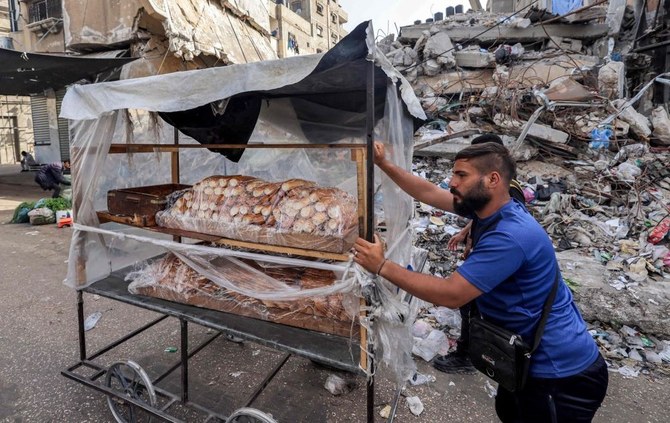
- Egypt reiterates opposition to any move on Rafah
- Warnings tell of expected losses and negative repercussions
CAIRO: Egypt has denied any discussions with Israel regarding an offensive in the Palestinian city of Rafah in the southern Gaza Strip.
Diaa Rashwan, the head of Egypt’s State Information Service, has refuted what has been claimed in one of the major American newspapers: that Egypt has discussed with the Israeli side its plans for an offensive in Rafah.
Rashwan has affirmed the Egyptian stance — announced several times by its political leadership — of complete opposition to the operation, which it is thought will lead to further massacres, massive human losses, and widespread destruction.
He added that Egypt’s repeated warnings have reached the Israeli side, from all channels, since Israel proposed carrying out a military operation in Rafah. These warnings tell of expected losses and the negative repercussions on the stability of the entire region.
Rashwan added that while Israel is contemplating its operation — which Egypt and most of the world and its international institutions stand against — Egyptian efforts since the beginning of the Israeli aggression had focused on reaching a ceasefire agreement and the exchange of prisoners and detainees.
He said Egypt was seeking the entry of humanitarian aid into the Gaza Strip, especially the north and Gaza City, and the evacuation of wounded and sick people for treatment outside the area.
Egypt has repeatedly opposed the displacement of Palestinians from Gaza and is warning against any military operation in Rafah.




